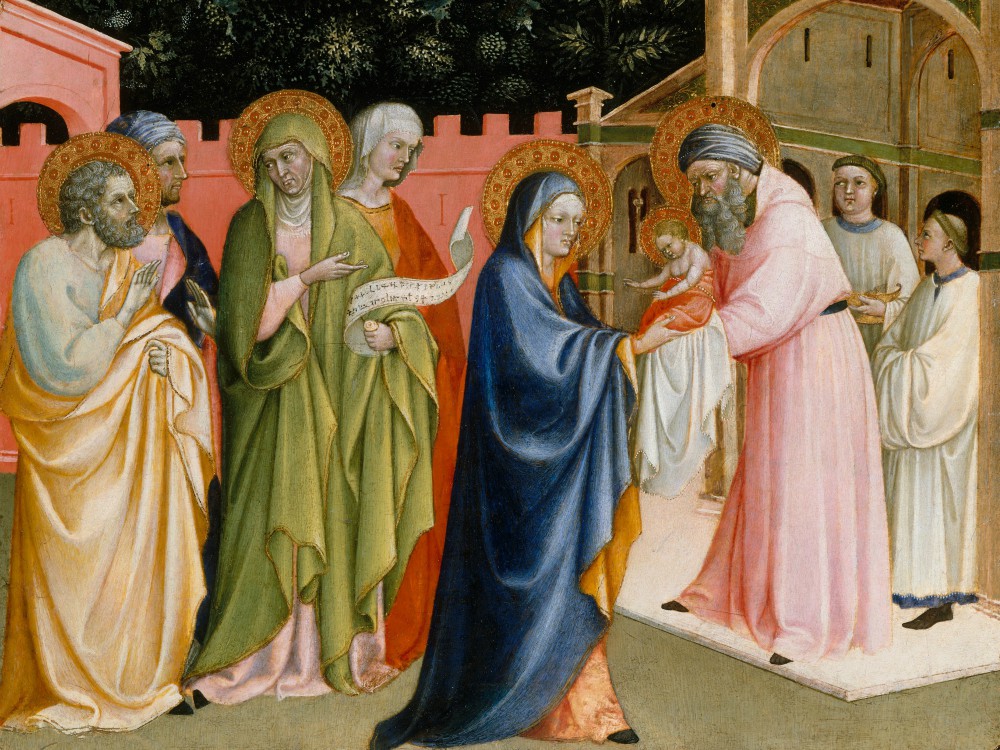
The Presentation in the Temple
Painted by the Portuguese artist Alvaro Pirez circa 1430
Metropolitan Museum of Art - Jack and Belle Linsky Collection
Image: ncronline.org
Today is the Feast of the Presentation of the Lord in the Temple and that of the Purification of Our Lady, recorded in the Gospel of St Luke.
There is a useful analysis of what St Luke is saying, of what he is not saying and does not say in a post from the National Catholic Register at What’s Happening at the Presentation of the Lord?
Candlemas has long been one of my favourite feasts. Indeed the sort is depicted in a nineteenth century stained glass window by the font in which I was baptised in my home parish church of St Giles in Pontefract, a church in which I was to spend many happy hours as Parish Clerk
However it was when I went to Oxford that Candlemas became a major feature in my life, both religious and secular, through two, linked, associations.
My college, Oriel, the House of Blessed Mary the Virgin in Oxford, commonly called Oriel College, to give it its full designation, keeps Candlemas as its feast day with a Sung Evensong and Formal Hall - well I assume it still does - and this year it is approaching the 700th anniversary of its initial founding in 1324 by Adam de Brome, Rector of St Mary’s in the High. Less than two years later, in January 1326, Adam surrendered his foundation to King Edward II, who promptly refounded it in his own name and made Adam the first Provost.
Five centuries later Oriel was about to become the epicentre of what we now call the Oxford Movement. Its most famous, and significant, leader was St John Henry Newman. After his reception as a Catholic in 1845 he looked to create a community life for his immediate circle, modelled on life as he had known it in Oriel. Having visited the Roman Oratory he had found the Catholic equivalent and 176 years ago, on Candlemas 1848, just as much of Europe was about to explode in revolt and revolution, he established the Oratory of St Philip Neri in England. Although St John Henry was unable to establish an Oratory in Oxford in his lifetime one was created in 1990-93, and it was there that this Orielensis was received into full peace and communion in 2005.
If the window by the font told the story of Candlemas and metaphorically accompanied me on the path of life so too did the events of the troubled reign of King Edward II as a historian and so did the figure of Newman as I entered ever more into the world of Anglo-Catholicism and then, like Newman - led maybe by Newman himself “o’er moor and fen” - to realise where I needed to be, in the Catholic Church.
Lead, kindly light, amid the encircling gloomLead thou me onThe night is dark, and I am far from homeLead thou me onKeep thou my feet, I do not ask to seeThe distant scene, one step enough for me
I was not ever thus, nor prayed that thouShouldst lead me onI loved to choose, and see my path but nowLead thou me onI loved the garish day, and spite of fearsPride ruled my will, remember not past years
So long thy power hath blest me, sure it stillWill lead me onO'er moor and fen, o'er crag and torrent, tillThe night is goneAnd with the morn those angel faces smileWhich I have loved long since and lost a while
St John Henry Newman 1833
A happy Candlemas to all my readers.


No comments:
Post a Comment